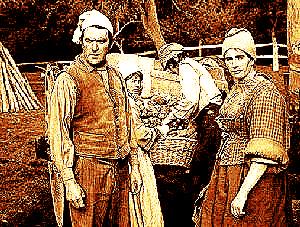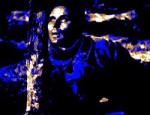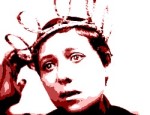Film Review
Moi, Pierre Rivière, ayant
égorgé ma mère, ma soeur et mon frère...
is one of the most haunting and thoughtfully composed French films of
the 1970s, a work of almost unparallelled cinematic veracity with its
extremely naturalistic account of a horrific crime that was a cause
célèbre in 1830s France. The film is closely based
on a book of the same title, published in 1973, by the eminent
philosopher Michel Foucault. As in Foucault's book, it presents
the events leading up to a gruesome triple murder through firsthand
testimony provided by the killer himself, 20-year-old Pierre
Rivière, and his neighbours in the Normandy village where the
crime took place. Director René Allio adopts the same
hyper-realist approach that he had employed, albeit less
successfully, on his earlier historical drama
Les Camisards (1972), using real
locations and a restrained style of mise-en-scène (characterised
by long takes and minimal movement by the actors) that makes every shot
appear as though it was taken from real life. Most of the cast is
made up of non-professional actors, recruited from the village where
the film was recorded.
Stripped of such cinematic embellishments as music and artificial
lighting,
Moi, Pierre Rivière...
possesses a raw documentary feel and bleak poetry that brings a
startling reality to what it shows, making it a film that is gruelling
to watch and yet also intensely emotionally involving. The
film's austere presentation and unremitting melancholic tone are
evocative of Robert Bresson's films, notably
Le Procès de Jeanne d'Arc
(1962) and
Mouchette (1967) which offer
similarly stark portraits of an outsider being brutalised and destroyed
by an unfeeling world. Allio collaborated on the screenplay with
two critics on the influential film journal
Les Cahiers du cinéma -
Pascal Bonitzer, who would later become an acclaimed screenwriter and
director, and Serge Toubiana, the future director of the
Cinémathèque française. Allio's assistant
director on the film was Nicolas Philibert, who would later emerge as
one of France's most acclaimed documentary filmmakers, best known for
his arresting tribute to primary school education,
Être
et avoir (2002). In his documentary
Retour en Normandie (2007),
Philibert paid homage to Allio's film by revisiting the Normandy
village where it was filmed and catching up with the
cast members, many of whom still had very strong views on the subject
of the film.
Moi, Pierre Rivière... is
not a film for the squeamish. Oddly, it is not the brutal murders
that shock, even when these are shown in sufficient graphic detail to
make you flinch in disgust, but rather the incredible human ordeal that
preceded it, as recounted by the disturbed young man who committed the
evil deed. Ostracised from the community to which he belonged, no
doubt on account of his latent mental illness, and traumatised by the
unrelenting cruelty that his mother meted out to his father, Pierre
Rivière is portrayed less as a monster and more as a martyr, his
crime shown to be the inevitable consequence of the social conditions
of his time. The film opens with the scene of the carnage, a
blood stained hovel in which three human lives ended in sudden brutal
savagery. Nothing, we tell ourselves, could excuse this
slaughter. The perpetrator must be evil, must be made to pay for
what he has done. It is only when the withdrawn Pierre
Rivière sits down at his table in his prison cell and begins to
tell us his story, with simple yet potent eloquence, that our feelings
change. The killings were merely the final chapter in a saga of
malice and suffering that had gone on for twenty years. Pierre
does not set out to excuse himself from his crime but merely to explain
how he was impelled, by instincts he could not control, to murder his
mother, his sister and his little brother one day in June 1835.
Today, there is no question that Pierre would be diagnosed as mentally
ill, but at the time of his crime his condition (sociopathy or
schizophrenia) was unknown and he was therefore judged to be
responsible for his actions - this is the real tragedy of his
story. Pierre Rivière's case is historically significant
in that it was the first instance in which psychiatric evidence was
heard in a court of law, a significant milestone in the development of
modern jurisprudence.
What makes the film so particularly poignant and memorable is
Claude Hébert's harrowingly authentic portrayal
of the tormented Pierre Rivière. In common with all of the actors who played the
villagers in the film, Hébert was a non-professional with no
prior acting experience, yet he gives a performance (indeed a
non-performance, since Hébert seems to live rather than act his
part) that no trained actor could ever hope to emulate. There is
an angelic gentleness and innocence to Hébert's screen persona
which is completely at odds with the crime that has been
committed. We even find it hard to accept his admission that he
derives pleasure in torturing frogs and birds. Yet, in just a few
shots, the camera manages to show us the monster that lurks beneath the
surface. Fleetingly, we glimpse a spine-chilling inhumanity in
his expression, a desolate coldness in his penetrating eyes. Pierre is
possessed by evil, but he himself is not evil. However despicable
the acts that he has committed, our sympathies remain with him, with
this sad wretch afflicted with an illness which no one recognises as
such and a compassion for his father that will drive him to an act of
self-sacrificing desperation. Such is the power of
Hébert's unselfconscious and deeply introspective interpretation
of Pierre that we cannot help but sympathise with him and loathe the
circumstances that led to his tragic coup de tête. After
this film, Hébert enjoyed a short but successful career as an
actor, notably taking the lead in Jacques Doillon's
La Drôlesse (1979), but he
gave up acting in the early 1980s to become a priest and ended up
working amongst the destitute of Haiti.
Despite some generally positive reviews,
Moi, Pierre Rivière... was not
a commercial success when it was first released. It has remained
overlooked, if not completely forgotten, for thirty years, until
Nicholas Philibert released his revealing documentary about the film in
2007. Thanks to Philibert's efforts,
Moi, Pierre Rivière... has
come back into circulation and is enjoying a long overdue
reappraisal. The film is not only worth watching for the
remarkable story it relates and the devastatingly humane way in which it
tells it, but also because it is soberingly relevant for our
times. It cautions us against rushing to judgement when some
atrocity is committed and makes us aware that not all crimes are
perpetrated by evil individuals who are responsible for their
actions. Unfavourable social factors and mental illness can often
lie behind what look like acts of senseless barbarity, and we risk
becoming barbarians ourselves if we fail to recognise this and merely
ascribe evil intent to all crimes.
Moi, Pierre Rivière... is not
only a superlative piece of cinema, it is also a valuable social
document from which we can all learn something.
© James Travers 2011
The above content is owned by frenchfilms.org and must not be copied.


